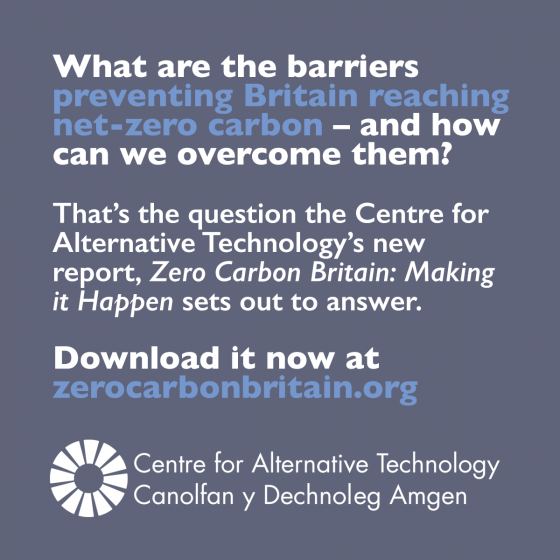Headlines
- ‹ previous
- 5 of 24
- next ›
Zero Carbon Britain: new report
Monday 27th February, 2017
A new report launched today by the Centre for Alternative Technology (CAT) explores the barriers to reaching net zero greenhouse gas emissions, looking at how these can be overcome in a way that could bring a wide range of additional benefits.
‘Zero Carbon Britain: Making it Happen’ brings together a broad range of evidence from academic literature and grassroots projects to create a picture of the inter-related solutions that we need to reach zero carbon.
Rather than an unresolved technical challenge, it is increasingly accepted that rising to the climate challenge presents a mix of psychological, political and economic barriers. Zero Carbon Britain: Making it Happen sets out the positive, connected approach we need to overcome them.
Mapping out cutting-edge solutions from psychology, sociology, political science, economics and other social sciences, the report also draws on lessons from arts, culture, and faith and spiritual practice. Drawing on findings from a wide range of peer-reviewed research, it integrates these with leading expert views and stories from real-life projects that demonstrate how we can overcome barriers in innovative and exciting ways.
Project Coordinator Paul Allen said: “Providing clear evidence that workable solutions already exist is vital. It empowers citizens and gives policymakers no excuse for inaction. CAT’s previous research has shown that we have all the tools and technologies we need; this new report now demonstrates how we can overcome the cultural, economic and political barriers.”
CAT Chief Executive Adrian Ramsay said: “The shift to zero carbon could be one of the most exciting opportunities in human history, offering many benefits including better housing, accessible transport, reduced obesity, better physical and psychological wellbeing, and more jobs. It’s essential that we understand and start to overcome the barriers to making this shift happen.”
We were happy to contribute to the buildings sections of the report, and encourage you to share it widely using #ZCB and the link below:

